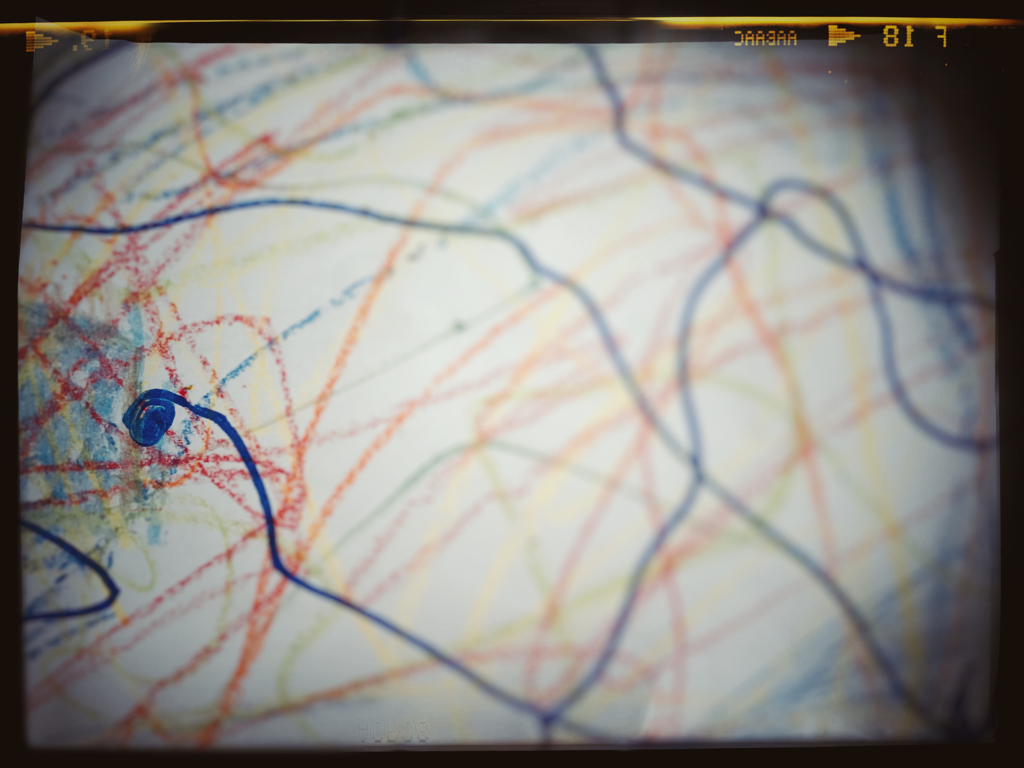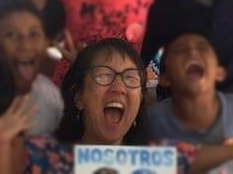|
Forever ago I spent a year as an art therapist at Jose de Diego Elementary School in Chicago, in a Spanish speaking neighborhood with Spanish speaking kids. This was a neighborhood that was colorful and lively, with people from all over Central America and Mexico; their language bonded them. Most of the kids spoke English, but it was their second language; Accents were strong, Spanish was frequently sprinkled into the mix, and some kids, recent immigrants, spoke no English at all. I spoke no Spanish, and I learned only 2 words that year: cacahuates (peanuts) and tijeras (scissors). I was grateful the process of art didn’t need a lot of words, and I wasn’t convinced I needed to learn Spanish.
My mentor and advisor, also an art therapist, was fluent in Spanish as her second language. She had been at the school for a long time, she knew the culture well, and was respected by staff, teachers, and students. She taught me to slow down and do my work without words; how to look and observe. The kids will tell you all kinds of things with their bodies she said. They will tell you all you need to know through their posture, their breathing, their glance and gaze. She made the quiet time meaningful. I remember the hours spent with all the dark haired, brown skinned kids in that tiny art therapy room. Sometimes they worked in silence, absorbed in their projects. Sometimes there was laughter and chatter. I remember teachers being doubtful of the time I spent with the kids, with found objects, glue, crayons, and tijeras. How could art possibly “fix” the problems the teachers encountered in classes—behavior problems, attention deficits, poor grades and social anxieties. I remember one tiny young boy who didn’t speak English at all, he was in kinder or primaria at most. Each week he worked in silence and communicated what he wanted with actions and meaningful looks. One day he guided me out into the hall where I kept random supplies they could select from in lockers. He picked a towering roll of paper and some markers and crayons. He chose to work in the hall, the only space that would accommodate that enormous roll of white that swallowed him when he sat in the middle of it and began to draw. I quietly sat and watched with anticipation as he scratched out a building, then a car with more people drawn in it than I knew would be legal. The empty space he filled with a single line that zigged, and zagged and rolled this way and swerved that way. The formerly blank white surface was now a maze of pathways and tangles in all the colors of the rainbow. He declared it complete by rolling up the drawing and stuffing it into one of the empty lockers. He grabbed me by hand and indicated it was time to head back to class. That was the last time I saw him. His absence was later explained a couple of weeks later by my mentor; the entire family had abruptly moved back to Mexico. The image finally made sense and story became clear as I realized so much was expressed in that silent hour. Chaos, distance, time, apprehension and anxiety. I often thought of that young boy and his journey back to Mexico. If I drew a picture of my journey to Mexico, I might draw it just like he did— Big. Colorful. A little chaotic, and a little confusing... I would top it all off with all the colors of an arcoíris With roads and paths that are at times totally uncertain, but amidst it all there are parts that emerge from the confusion with clarity and directness, and there the path is completely defined.
3 Comments
|
AuthorWho are all these kids? And how in the world did I end up in Mexico?
I am an artist and art therapist with a passion to change the the lives of kids through the power of creating art. If you are love art and kids join me on this exciting journey. I’m sharing it all here; every hope, every uncertain moment, every sweaty step, and each small victory. —anita yeh norrie Archives
October 2019
Categories
All
|


 RSS Feed
RSS Feed
